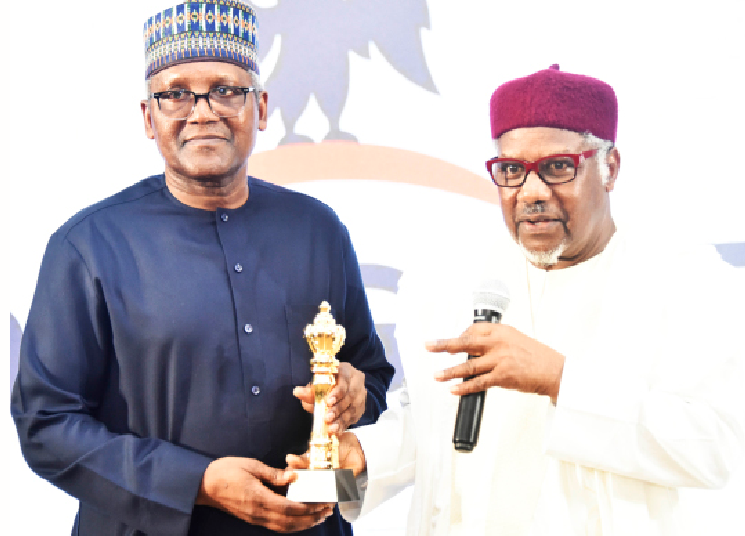The importance of a vibrant manufacturing sector in emerging economies cannot be over-emphasised as manufacturing is key to economic growth and underpins inclusive and sustainable development.
No country in the world has ever industrialised or attained developed nation status without having a thriving manufacturing sector. Without a doubt, manufacturing is the heartbeat of industrialisation and the bedrock for inclusive economic growth and development.
Recently at the second Adeola Odutola lecture in commemoration of the 50th Annual General Meeting (AGM) of the Manufacturers Association of Nigeria (MAN), Aliko Dangote delivered a paper on the theme ‘Agenda Setting for Industrialising Nigeria in the Next Decade’ held in Lagos, recently.
MAN observed that the choice of guest speaker is strategic and only experienced industrialists are well equipped to do justice to the theme, visibly highlight essential advocacy issues, suggest workable solutions and point the sector to key industrial development agenda for the next 10 year, saying that Dangote’s investments cut across diverse sectors of the economy, covering manufacturing, banking, agriculture, construction, transportation, textile, oil and gas, automobile to mention a few, with strong presence in over 14 African countries.
Industrial Sector Performance
Nigeria’s industrialisation process has been greatly challenged by structural and institutional constraints, particularly funding. These factors have over the years cumulatively contributed to its disappointing performance. For instance, in the last decade, average share of manufacturing value added to GDP in countries like China and Malaysia stood at 41 per cent and 38 per cent respectively; compared to 25 per cent in Nigeria. Similarly, our trade indices in the last decade have been relatively poor; total exports for instance accounted for 16 per cent of GDP as against 70 per cent recorded by Malaysia.
In terms of capacity utilisation, a major performance indicator which reflects the ability of manufacturing companies to meet rising demand without increasing cost, Nigeria achieved a rate of 55 per cent compared to 76 per cent and 78 per cent in China and South Africa respectively. The country’s dwindling industrial performance has significant socio-economic implications, as poverty and unemployment continue to rise. While there is a pressing need to create more jobs, the high cost of doing business in the face of declining consumer purchasing power puts enormous strain on manufacturers, with many scaling down production and some shutting down completely.
Dangote said it is imperative that the familiar challenges limiting the pace of industrialisation are frontally addressed while setting a clear-cut agenda for the next 10 years. He identified priority investments in infrastructure and core industries among other recommendations, as vital panaceas to boost Nigeria’s economy to its desired level among contemporary nations and in the world overall.
Dangote identified various measures which needed to be put in place to allow Nigeria speed up its industrialisation process and development growth. These measures included investment in infrastructure; creation of business-enabling Policy Framework; development of core industries; macroeconomic stability; facilitation of sectoral linkages and sustaining of the federal government’s recent efforts at ensuring security of lives, properties and investments across the nation.
The business titan examined the performance of the industrial sector in Nigeria; identified the nexus between industrialisation and economic development with Nigeria and China as case study; analysed the manufacturing sector in the country with focus on its growth trajectory, current status and challenges, and set an agenda for the next 10 years with an implementation roadmap.
According to him, the experience in various parts of the world has shown that industrialisation drives economic growth and development, which improves living standards as evident by the high output and per capita income in industrialised countries.
“The rate of industrialisation in Nigeria has been slow as evidenced by the low contribution of manufacturing to GDP, poor capacity utilisation and constrained export of manufactured products within and outside the continent.
“Nigeria’s industrialisation process has been greatly challenged by structural and institutional constraints, particularly funding. These factors have over the years cumulatively contributed to its disappointing performance.”
He noted that “from 1960 to 2003, the development trajectory of China by far outpaced that of Nigeria within the same period even though Nigeria began on a seemingly better footing. It is therefore important to track back to where Nigeria ‘dropped the ball’ with a view to repositioning the country to the path of growth, development, and social upliftment.
“Based on the comparative analysis of Nigeria and China, one can safely make the following deductions; the numerical strength of a nation (population) can indeed be translated into economic wealth; steady growth in manufacturing output is possible when the operating environment is conducive; no nation can easily transit from ‘developing’ to ‘newly industrialised’ without a vibrant manufacturing sector; effective implementation of long term plans backed with policy consistency will promote enduring economic growth and development.”
According to Dangote, Nigeria’s manufacturing sector is dominated by light manufacturing with only a few firms operating in the heavy segment of the sector. There are several factors that need to be in place to accelerate the growth of the manufacturing sector in Nigeria. These include: security and rule of law, industry-oriented government policy; adequate infrastructure; industry-oriented Research & Development (R&D); a well-developed SME sector; building of human capacity, and embrace of technology to improve efficiency through automation of manufacturing processes.
On current status of the manufacturing sector, Dangote noted that manufacturing was singled out in the Nigerian Industrial Revolution Plan (NIRP) as the driver of industrialisation and economic growth.
“The contribution of manufacturing to Real GDP in Nigeria contrasts with what was obtained in countries like China (27.16 per cent in 2019); Germany (19.11 per cent); Japan (20.74 per cent) and South Africa (13.53 per cent). To drive industrialization and sustained economic growth in Nigeria, it is important that deliberate policies that are manufacturing-specific should be designed to support manufacturing activities and address the perennial challenges of the sector. It is important to note that the current government policies, if fully implemented, are good enough to address most of the challenges we are now facing,” he said.
Among manufacturing challenges, he identified acute shortage of forex; dearth of long-term funds; limited infrastructure; policy inconsistency/implementation/ enforcement; over-regulation; multiple and high taxes for the industries and insecurity.
According to Dangote, in consideration of the afore-mentioned challenges, there is an urgent need for a shift in policy approach and strategy to reposition the manufacturing sector for growth over the next ten years. It is imperative that the familiar challenges limiting the pace of industrialization are frontally addressed while setting a clear-cut agenda for the next 10 years.
While setting an agenda for the next 10 years, Dangote said, “to achieve industrialisation goals, it is necessary for a nation to formulate plans and policies that will enhance and sustain industrial development. Sustainable industrial development involves establishment of a conducive environment to encourage investment and ensure efficient usage of resources to increase productivity and growth of the nation.
“Nigeria needs to henceforth intensify efforts at promoting industrialization with specific focus on the attainment of the following targets in the next 10 years: 15 per cent manufacturing sector growth, 20 per cent manufacturing contribution to GDP, 15 per cent growth in export of manufactured products, 10 per cent increase in the share of manufacturing to total export merchandise, stronger inter-industry linkage between SMEs and large corporations, improved manufacturing contribution to Government tax revenue and 20 per cent increase in manufacturing employment.”
In his conclusion, Dangote noted that, “the drive to transform Nigerian into an industrialised nation has been a consistent goal of successive governments since independence. It is therefore, imperative that we focus on sectors with great potential for inclusive growth. Sustainability must be central to our industrial development agenda.”
“Industrialisation, driven by manufacturing, has the capacity to facilitate enduring economic growth. The transition mechanism entails the availability of required resources, adoption of appropriate technology, provision of favourable operating environment, human capital development, stable macroeconomic environment and adequate infrastructure,” he added.





